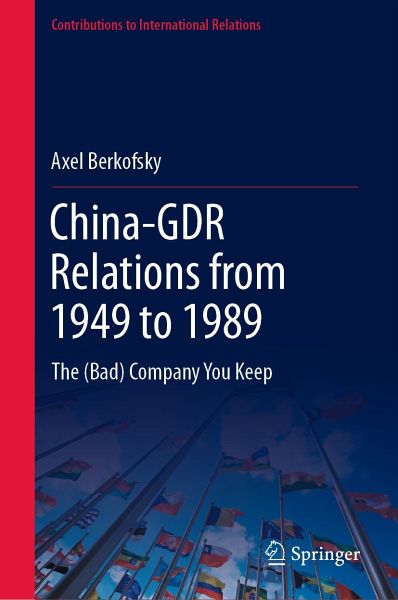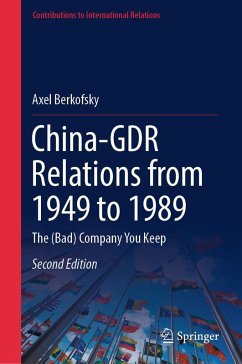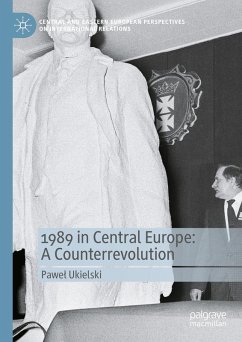
China-GDR Relations from 1949 to 1989 (eBook, PDF)
The (Bad) Company You Keep
Versandkostenfrei!
Sofort per Download lieferbar
104,95 €
inkl. MwSt.
Weitere Ausgaben:

PAYBACK Punkte
52 °P sammeln!
This book provides an in-depth analysis of the relations between China and the German Democratic Republic (GDR) from 1949 to 1989. These relations were characterized by some "ups" but many more "downs," e.g. when, in the early 1960s, the Soviet Union ordered its vassal state in East Berlin to begin treating its former socialist comrade and brother-in-arms as an adversary and indeed enemy.Drawing on a wealth of archival material, especially from the archive of the GDR's ruling party, this book examines selected issues and elements of East German and Chinese domestic and foreign policy. In order...
This book provides an in-depth analysis of the relations between China and the German Democratic Republic (GDR) from 1949 to 1989. These relations were characterized by some "ups" but many more "downs," e.g. when, in the early 1960s, the Soviet Union ordered its vassal state in East Berlin to begin treating its former socialist comrade and brother-in-arms as an adversary and indeed enemy.
Drawing on a wealth of archival material, especially from the archive of the GDR's ruling party, this book examines selected issues and elements of East German and Chinese domestic and foreign policy. In order to better grasp the nature and the historical context of the bilateral relationship, it offers detailed insights into the following aspects: 1. the bilateral "honeymoon period" from 1949 to the late 1950s, which was accompanied by the two parties supporting and applauding each other's oppressive domestic and ill-fated economic policies, including Mao's Great Leap Forward and the Cultural Revolution; 2. relations during the 1960s, when the "Sino-Soviet Split" defined the quality and level of bilateral animosities; 3. the 1970s, when Beijing replaced socialist comradeship with East Berlin with trade and aid from the US and West Germany; and 4. the resumption of Sino-East German relations in the 1980s and the subsequent period up to the Tiananmen Square protests and the collapse of the GDR in 1989. The book will appeal to historians, political scientists and scholars of international relations, as well as policymakers, diplomats, and others with an interest in this previously under-researched area.
Drawing on a wealth of archival material, especially from the archive of the GDR's ruling party, this book examines selected issues and elements of East German and Chinese domestic and foreign policy. In order to better grasp the nature and the historical context of the bilateral relationship, it offers detailed insights into the following aspects: 1. the bilateral "honeymoon period" from 1949 to the late 1950s, which was accompanied by the two parties supporting and applauding each other's oppressive domestic and ill-fated economic policies, including Mao's Great Leap Forward and the Cultural Revolution; 2. relations during the 1960s, when the "Sino-Soviet Split" defined the quality and level of bilateral animosities; 3. the 1970s, when Beijing replaced socialist comradeship with East Berlin with trade and aid from the US and West Germany; and 4. the resumption of Sino-East German relations in the 1980s and the subsequent period up to the Tiananmen Square protests and the collapse of the GDR in 1989. The book will appeal to historians, political scientists and scholars of international relations, as well as policymakers, diplomats, and others with an interest in this previously under-researched area.
Dieser Download kann aus rechtlichen Gründen nur mit Rechnungsadresse in A, B, BG, CY, CZ, D, DK, EW, E, FIN, F, GR, HR, H, IRL, I, LT, L, LR, M, NL, PL, P, R, S, SLO, SK ausgeliefert werden.












